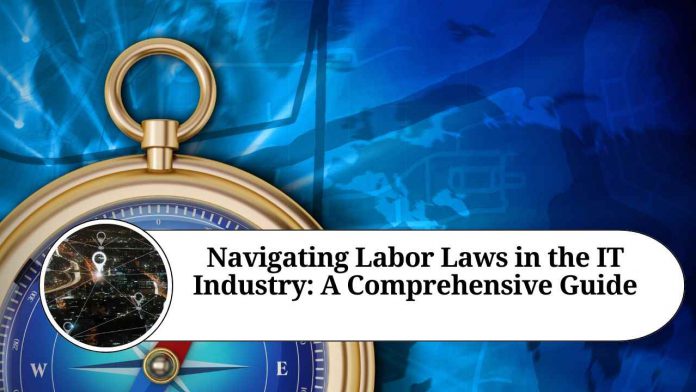Introduction
In today’s technology-driven world, the IT industry plays a crucial role in driving innovation and economic growth. As IT companies continue to flourish, it is essential for employers and employees to be familiar with labor laws that apply specifically to this sector. This blog post aims to provide a comprehensive guide to the labor laws applicable to IT companies, ensuring compliance and fostering a fair and harmonious work environment.
-
Classification of Employees
Determining the proper classification of employees is the first step towards understanding labor laws. In the IT industry, workers can be classified as full-time employees, part-time employees, independent contractors, or temporary workers. Each classification comes with specific legal obligations and entitlements, such as minimum wage, overtime pay, and benefits. Accurate classification is crucial to avoid potential legal issues and ensure fair treatment of employees.
-
Wage and Hour Regulations
Wage and hour regulations play a fundamental role in protecting employees’ rights in the IT industry. These regulations govern aspects such as minimum wage, overtime pay, and work hours. It is crucial for IT companies to comply with these laws to prevent wage theft and maintain a healthy work-life balance for their employees. Additionally, employers must be aware of exemptions, such as those related to highly skilled computer professionals, which may affect overtime pay requirements.
-
Anti-Discrimination Laws
Discrimination has no place in the workplace, and the IT industry is no exception. Employers must ensure that all hiring, promotion, and termination decisions are made based on merit and not on factors such as race, gender, age, religion, or disability. Familiarity with anti-discrimination laws is crucial for creating an inclusive and diverse work environment that promotes equal opportunities for all employees.
-
Intellectual Property and Confidentiality
Protection of intellectual property and maintaining confidentiality is of utmost importance in the IT industry. Employers should establish clear policies and agreements regarding ownership of intellectual property developed by employees during their employment. Non-disclosure agreements (NDAs) and non-compete clauses may be necessary to safeguard trade secrets and prevent employees from sharing sensitive information with competitors. However, these agreements must be carefully drafted to ensure they are enforceable and within the limits of the law.
-
Privacy and Data Security
IT companies handle vast amounts of sensitive data, making privacy and data security paramount. Employers must comply with relevant data protection laws and regulations, such as the General Data Protection Regulation (GDPR) or the California Consumer Privacy Act (CCPA). Employees should receive training on data privacy and security practices, and the company must implement robust measures to protect personal and confidential information.
-
Workplace Safety
While IT work is predominantly sedentary, employers must still prioritize workplace safety. Ergonomic workstations, regular breaks, and measures to prevent repetitive strain injuries should be implemented. Additionally, IT companies should have protocols in place to address potential cyber threats, as well as emergency procedures for physical workplace safety.
-
Employee Benefits and Leaves
Providing competitive employee benefits is essential for attracting and retaining top talent in the IT industry. Benefits may include health insurance, retirement plans, paid vacation and sick leave, parental leave, and flexible working arrangements. Employers must ensure compliance with relevant laws and regulations, such as the Family and Medical Leave Act (FMLA) or state-specific laws pertaining to paid leave.
Conclusion
Compliance with labor laws is crucial for IT companies to maintain a fair and harmonious work environment while avoiding legal complications. By understanding and adhering to the labor laws applicable to the industry, employers can protect their employees’ rights, foster a positive workplace culture, and build a foundation for long-term success.
Other Related Blogs: Section 144B Income Tax Act
Frequently Asked Questions (FAQs)
Q1: How should IT companies classify their employees?
A: IT companies should accurately classify their employees as full-time employees, part-time employees, independent contractors, or temporary workers. Each classification comes with specific legal obligations and entitlements, such as minimum wage, overtime pay, and benefits. Proper classification is crucial to ensure compliance with labor laws.
Q2: What are the wage and hour regulations that apply to IT companies?
A: Wage and hour regulations include minimum wage requirements, overtime pay, and work hour restrictions. IT companies must ensure they are paying their employees at least the minimum wage mandated by law and providing overtime pay for eligible employees who work more than a certain number of hours. Additionally, they must comply with laws regarding meal and rest breaks.
Q3: How can IT companies prevent discrimination in the workplace?
A: IT companies must adhere to anti-discrimination laws and ensure that all employment decisions are made based on merit, without considering factors such as race, gender, age, religion, or disability. It is crucial to have equal opportunity policies in place, promote diversity and inclusion, and provide training to employees on preventing discrimination.
Q4: How can IT companies protect intellectual property and maintain confidentiality?
A: IT companies should establish clear policies and agreements regarding ownership of intellectual property developed by employees during their employment. Non-disclosure agreements (NDAs) and non-compete clauses may also be necessary to protect trade secrets and sensitive information. It is important to draft these agreements carefully to ensure their enforceability and compliance with the law.
Q5: What privacy and data security measures should IT companies implement?
A: IT companies must comply with relevant data protection laws and regulations, such as the GDPR or CCPA, depending on their jurisdiction. They should implement robust measures to protect personal and confidential data, including encryption, access controls, regular security audits, and employee training on data privacy and security practices.
Q6: How can IT companies ensure workplace safety?
A: While IT work is largely sedentary, employers must prioritize workplace safety. This includes providing ergonomic workstations, promoting regular breaks, and implementing measures to prevent repetitive strain injuries. Additionally, IT companies should have protocols in place to address cyber threats and emergency procedures for physical workplace safety.
Q7: What employee benefits and leaves should IT companies provide?
A: IT companies should consider providing competitive employee benefits, including health insurance, retirement plans, paid vacation and sick leave, parental leave, and flexible working arrangements. Compliance with laws such as the FMLA or state-specific laws pertaining to paid leave is essential to ensure employees receive their entitled benefits and leaves.




















